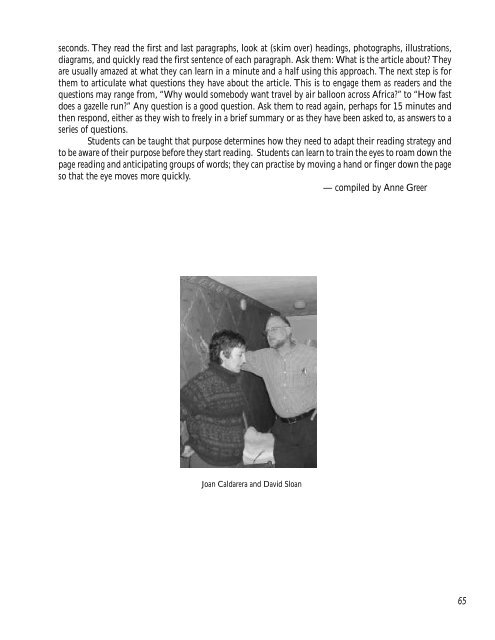Colloquium on English - Research Institute for Waldorf Education
Colloquium on English - Research Institute for Waldorf Education
Colloquium on English - Research Institute for Waldorf Education
You also want an ePaper? Increase the reach of your titles
YUMPU automatically turns print PDFs into web optimized ePapers that Google loves.
sec<strong>on</strong>ds. They read the first and last paragraphs, look at (skim over) headings, photographs, illustrati<strong>on</strong>s,<br />
diagrams, and quickly read the first sentence of each paragraph. Ask them: What is the article about? They<br />
are usually amazed at what they can learn in a minute and a half using this approach. The next step is <strong>for</strong><br />
them to articulate what questi<strong>on</strong>s they have about the article. This is to engage them as readers and the<br />
questi<strong>on</strong>s may range from, “Why would somebody want travel by air ballo<strong>on</strong> across Africa?” to “How fast<br />
does a gazelle run?” Any questi<strong>on</strong> is a good questi<strong>on</strong>. Ask them to read again, perhaps <strong>for</strong> 15 minutes and<br />
then resp<strong>on</strong>d, either as they wish to freely in a brief summary or as they have been asked to, as answers to a<br />
series of questi<strong>on</strong>s.<br />
Students can be taught that purpose determines how they need to adapt their reading strategy and<br />
to be aware of their purpose be<strong>for</strong>e they start reading. Students can learn to train the eyes to roam down the<br />
page reading and anticipating groups of words; they can practise by moving a hand or finger down the page<br />
so that the eye moves more quickly.<br />
— compiled by Anne Greer<br />
Joan Caldarera and David Sloan<br />
65

















